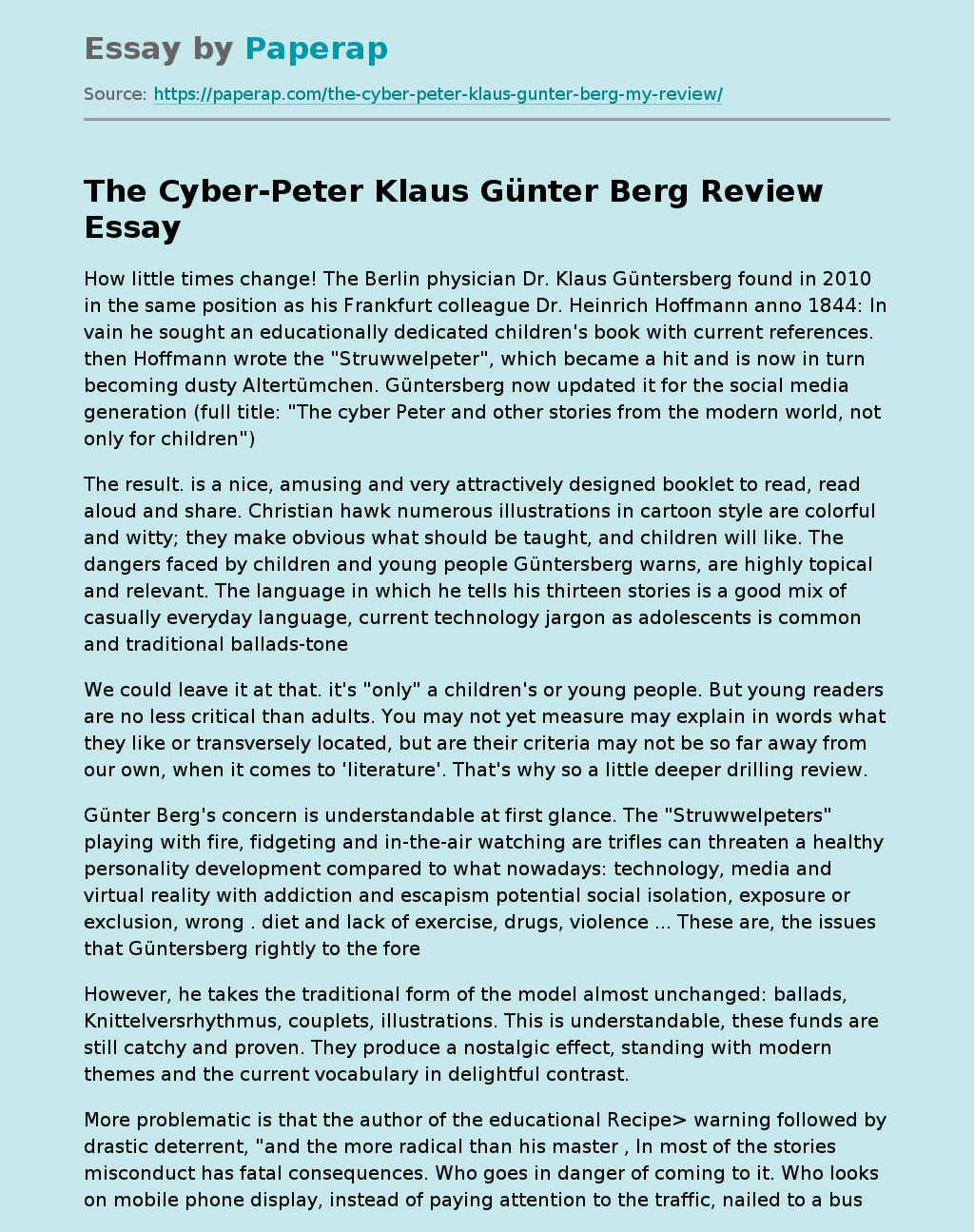"The Cyber-Peter" by Klaus GünterBerg
How little times change! The Berlin physician Dr. Klaus Güntersberg found in 2010 in the same position as his Frankfurt colleague Dr. Heinrich Hoffmann anno 1844: In vain he sought an educationally dedicated children’s book with current references. then Hoffmann wrote the “Struwwelpeter”, which became a hit and is now in turn becoming dusty Altertümchen. Güntersberg now updated it for the social media generation (full title: “The cyber Peter and other stories from the modern world, not only for children”).
The result. is a nice, amusing and very attractively designed booklet to read, read aloud and share. Christian hawk numerous illustrations in cartoon style are colorful and witty; they make obvious what should be taught, and children will like. The dangers faced by children and young people Güntersberg warns, are highly topical and relevant. The language in which he tells his thirteen stories is a good mix of casually everyday language, current technology jargon as adolescents is common and traditional ballads-tone.
We could leave it at that. it’s “only” a children’s or young people. But young readers are no less critical than adults. You may not yet measure may explain in words what they like or transversely located, but are their criteria may not be so far away from our own, when it comes to ‘literature’. That’s why so a little deeper drilling review.
Günter Berg’s concern is understandable at first glance. The “Struwwelpeters” playing with fire, fidgeting and in-the-air watching are trifles can threaten a healthy personality development compared to what nowadays: technology, media and virtual reality with addiction and escapism potential social isolation, exposure or exclusion, wrong .
diet and lack of exercise, drugs, violence … These are, the issues that Güntersberg rightly to the fore.
However, he takes the traditional form of the model almost unchanged: ballads, Knittelversrhythmus, couplets, illustrations. This is understandable, these funds are still catchy and proven. They produce a nostalgic effect, standing with modern themes and the current vocabulary in delightful contrast.
More problematic is that the author of the educational Recipe> warning followed by drastic deterrent, “and the more radical than his master , In most of the stories misconduct has fatal consequences. Who goes in danger of coming to it. Who looks on mobile phone display, instead of paying attention to the traffic, nailed to a bus. Who eats only fast food, dies of obesity. The protagonist as a blind, deaf, paraplegic in a wheelchair.
Such cruelty know kids even from folk tales and from “Max and Moritz”. And who does not work out for all time the explicit images just how Paulinchen in bright flames or the tailor “uncertain folding / The shear ‘thumbs down” even in the elegant jump the Konrad – schnippst that it drips?
But oddly: The “classic” crimes seem logical obvious, perhaps even a touch ironic. One may also feel pity ( “A pile of ash remains alone / And both shoes’, so pretty and nice.”). But only two of the nine “Struwwelpeter” -Balladenhelden must die; two are injured; others come off lightly (fall off the table, be dripping wet) or fanciful almost poetic punished “(colored black, laughed at by little fish, carried in the clouds). And the interlude “the wild hunter” – Has’ pilfered hunter ‘Flint’ and the Brill “applies to him, Mrs. inveigh against zerdepperte Coffee Mug’ bunny hops with coffee spoons – not a veritable piece of absurd theater with antiautoritärem tenor?
The balance sheet in “Cyber-Peter” is relentless. Six of the twelve ballads are fatal (the Reaper not only perpetrators but also a victim and a mother caught), four physical with permanent impairments. Where the old “Struwwelpeter” was mischievous, sardonic and witty, the ultra-modern “Cyber-Peter” unfortunately often acts in spite of his most nimble language heartless and seems dead serious to lift the threat of finger.
On most successful the last story, for it leaves the only one positive outlook. It is so far the only educational modern. The “stroll-Leo” is indeed sit and flies out of the sports team, but then he changed: “Now he is fixed, as the fire department.” A thought-provoking story is that of two unequal brothers who have to deal with bullies and extractors. “First of all is the sheer envy / The source of wrongdoing and disputes. / In the envy of all men are equal, / Whether black, whether white, whether poor or rich.” – as the final realization. But the solutions proposed seem to me badly simply: either pull or strongly retaliate ( “The bad guys are not going to teach; / Because only one thing to fight back”).
In comparing the “Cyber-Peter. “with his more senior than one hundred and sixty years, this model has proven to be quite still up to date. Some of his subjects (animal abuse, eating disorders, hyperactivity, ADHD, bullying) are more relevant than ever, others might timeless. The vocabulary and Zeitgeist update makes the “Cyber-Peter” attractive, will leave him but quickly become obsolete. In some other aspects, he seems almost old-fashioned (The protagonists are called John, George, Walter, Erwin, Kuno, Bruno,Philio).
Who so this book is a profit? Adults will enjoy themselves, find the vocabulary cool and widespread prejudices confirmed by today’s youth, and they will remember their children’s books. Young readers (- in the book occurs only one girl on) are already familiar with, but find that dramatically exaggerated consequences ridiculous the actual dangers. Will the children (recommended age 5): Most of them are neither the factual backgrounds yet understand the literary references. The brutality she likes serious scare. And who knows what dangers very different caliber they are threatening in some years when the have long been painted here of the past? Education has a fundamental effect. For this, the “Cyber-Peter” can offer to talk about.
"The Cyber-Peter" by Klaus GünterBerg. (2019, Nov 18). Retrieved from https://paperap.com/the-cyber-peter-klaus-gunter-berg-my-review/

